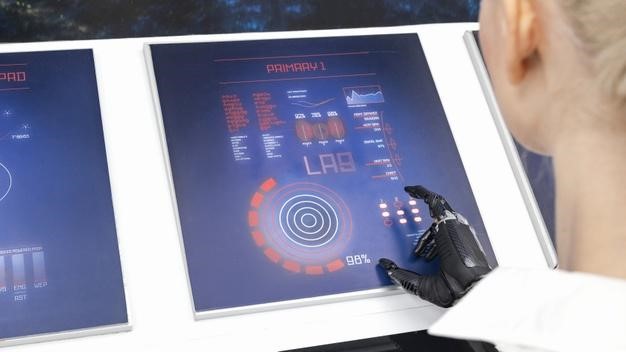Scientific and technological innovations have changed the nature of service delivery across various sectors around the globe. In this regard, the medical sector is not an exception at all.
Copyright by www.techiexpert.com
 In this informative article, we have considered the preliminary concept of Artificial Intelligence. We have illustrated the roles which AI is playing in the contemporary medical sector. Furthermore, we have focused on some revolutionary AI trends that are shaping the medical sector worldwide.
In this informative article, we have considered the preliminary concept of Artificial Intelligence. We have illustrated the roles which AI is playing in the contemporary medical sector. Furthermore, we have focused on some revolutionary AI trends that are shaping the medical sector worldwide.
1/3rd of the healthcare practitioners across the globe are already incorporating Artificial Intelligence in their practices. With the rapid advancement of technology, HealthITAn lyrics have come into being. It involves in-depth exploration of several actionable insights collected from Electronic Health Records (EHR)
What Is Artificial Intelligence?
Artificial Intelligence is a form of super-advanced technology originally based on the concept of human intelligence. The primary goal was to make machines behave with intellect just like humans. The application of AI entailed teaching robots to respond and learn intelligently according to specific command inputs.
It Is evident that modern AI is linked to other advanced technological ideas, for instance, machine learning (ML). The ML algorithms give allowance to the machines for magnifying their functions. The rationale behind this is that the machines encounter complex algorithms.
Additionally, Deep learning and Neural networks are two other essential pillars of Artificial Intelligence.Deep learning makes these machines capable of taking actions on the basis of previous data and current trends. Moreover, neural networks lie with the coordinative functions of different AI tools.
How Artificial Intelligence Is Facilitating The Medical Sector?
Despite being at its Infant stage in the medical sector, Artificial intelligence is growing aggressively. In a wide range of healthcare aspects, its footprints can be found nowadays. In addition to hospitals, AI is being used in health insurance firms as well as medical research.
Below are explained the major contributions of AI in the healthcare sector worldwide:
Thank you for reading this post, don't forget to subscribe to our AI NAVIGATOR!
1. Diagnosis
AI can precisely detect some most critical health complexities like diabetes. Additionally, it is able to augment therapeutics and diagnostics in multiple fields including neurology, oncology and endocrinology. In the medical sector, this is an additional footstep.
2. Treatment Plans
Drug interaction is the primary constituent of developing treatment plans. Often it becomes riskier for people taking multiple other medications. Machine learning algorithms can extract specific information about drugs. Therefore, AI is used to reduce the struggle of drug intake.
3. Health Monitoring
Artificial Intelligence (AI), is also successful in terms of fault diagnosis and health monitoring or condition monitoring. These tools are applied for routine health maintenance. Nevertheless, the implementation of AI in health monitoring is still not popular. […]
Read more: www.techiexpert.com


Scientific and technological innovations have changed the nature of service delivery across various sectors around the globe. In this regard, the medical sector is not an exception at all.
Copyright by www.techiexpert.com
1/3rd of the healthcare practitioners across the globe are already incorporating Artificial Intelligence in their practices. With the rapid advancement of technology, HealthITAn lyrics have come into being. It involves in-depth exploration of several actionable insights collected from Electronic Health Records (EHR)
What Is Artificial Intelligence?
Artificial Intelligence is a form of super-advanced technology originally based on the concept of human intelligence. The primary goal was to make machines behave with intellect just like humans. The application of AI entailed teaching robots to respond and learn intelligently according to specific command inputs.
It Is evident that modern AI is linked to other advanced technological ideas, for instance, machine learning (ML). The ML algorithms give allowance to the machines for magnifying their functions. The rationale behind this is that the machines encounter complex algorithms.
Additionally, Deep learning and Neural networks are two other essential pillars of Artificial Intelligence.Deep learning makes these machines capable of taking actions on the basis of previous data and current trends. Moreover, neural networks lie with the coordinative functions of different AI tools.
How Artificial Intelligence Is Facilitating The Medical Sector?
Despite being at its Infant stage in the medical sector, Artificial intelligence is growing aggressively. In a wide range of healthcare aspects, its footprints can be found nowadays. In addition to hospitals, AI is being used in health insurance firms as well as medical research.
Below are explained the major contributions of AI in the healthcare sector worldwide:
Thank you for reading this post, don't forget to subscribe to our AI NAVIGATOR!
1. Diagnosis
AI can precisely detect some most critical health complexities like diabetes. Additionally, it is able to augment therapeutics and diagnostics in multiple fields including neurology, oncology and endocrinology. In the medical sector, this is an additional footstep.
2. Treatment Plans
Drug interaction is the primary constituent of developing treatment plans. Often it becomes riskier for people taking multiple other medications. Machine learning algorithms can extract specific information about drugs. Therefore, AI is used to reduce the struggle of drug intake.
3. Health Monitoring
Artificial Intelligence (AI), is also successful in terms of fault diagnosis and health monitoring or condition monitoring. These tools are applied for routine health maintenance. Nevertheless, the implementation of AI in health monitoring is still not popular. […]
Read more: www.techiexpert.com
Share this: